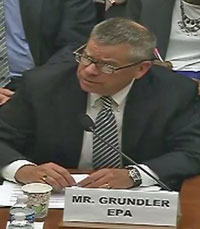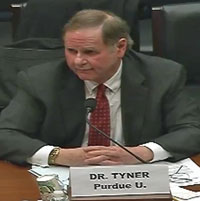The House Oversight Subcommittees on Interior and Healthcare, Benefits and Administrative Rules held a joint hearing Wednesday to ostensibly examine the Renewable Fuel Standard but was basically an attack on the law.
 EPA Office of Transportation and Air Quality Director Chris Grundler provided testimony at the hearing and attempted to explain the purpose and intent of the RFS, including what the agency can and cannot do under the law, to obviously unfriendly lawmakers who used the forum to bring up every argument against renewable fuels, from food versus fuel to the blend wall. Grundler repeatedly noted that the job of the EPA was to implement the law as Congress intended. “Introducing new fuels into the marketplace, especially cellulosic biofuels, is not an easy task,” said Grundler. “But that is the challenge Congress took on with the RFS program and we are committed to implementing the program … as Congress intended.”
EPA Office of Transportation and Air Quality Director Chris Grundler provided testimony at the hearing and attempted to explain the purpose and intent of the RFS, including what the agency can and cannot do under the law, to obviously unfriendly lawmakers who used the forum to bring up every argument against renewable fuels, from food versus fuel to the blend wall. Grundler repeatedly noted that the job of the EPA was to implement the law as Congress intended. “Introducing new fuels into the marketplace, especially cellulosic biofuels, is not an easy task,” said Grundler. “But that is the challenge Congress took on with the RFS program and we are committed to implementing the program … as Congress intended.”
 Purdue economics professor Dr. Wally Tyner was the lone voice on the panel supporting the benefits of the RFS, calling it one of the “appropriate and effective ways to move our economy towards lower GHG emissions.”
Purdue economics professor Dr. Wally Tyner was the lone voice on the panel supporting the benefits of the RFS, calling it one of the “appropriate and effective ways to move our economy towards lower GHG emissions.”
No one from the U.S. biofuels industry was invited to testify, which was distressing to the ethanol industry. “Unfortunately, the committee has stacked the witness list with oil company apologists intent upon undermining public support for this important program,” said Renewable Fuels Association (RFA) president and CEO Bob Dinneen. “Why is the committee afraid to hear all sides of the debate?”
“Holding a hearing on the RFS without any biofuels stakeholders is unacceptable and defeats the very purpose of what this congressional committee is tasked to accomplish,” added Growth Energy CEO Tom Buis. “The lack of diversity of opinions on this panel exemplifies political theater designed to drive a false narrative and discredit the success of the RFS. Furthermore, one of the most vocal RFS critics on the witness list was a professor who has been funded by the American Petroleum Institute (API).” He was referring to John DeCicco, a research professor with the University of Michigan Energy Institute, who conducted an unfavorable study on the RFS last year funded by the American Petroleum Institute.
The subcommittees also heard anti-RFS testimony from ActionAid USA and The Heritage Foundation.

